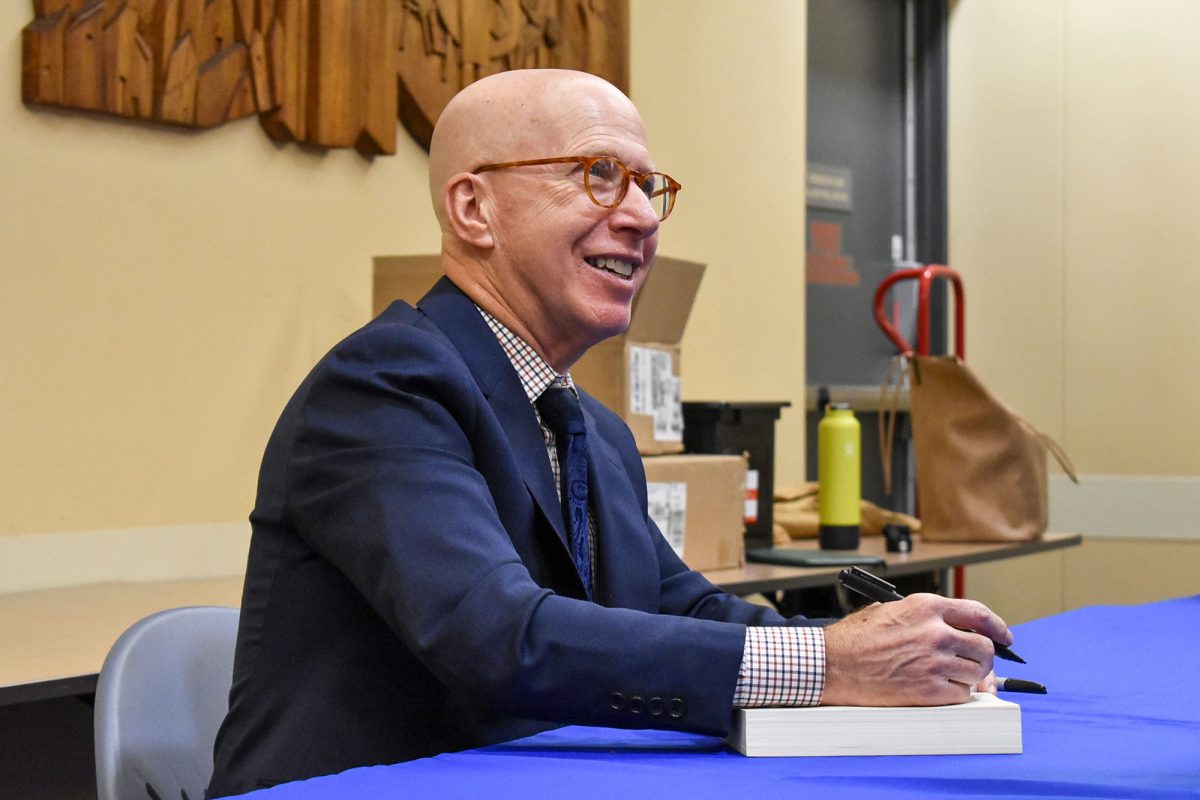On Feb. 10, journalist and biographer Jonathan Eig visited the Tompkins County Public Library to speak about his book “King: A Life.” In 2024, the Martin Luther King Jr. biography won a Pulitzer Prize. Eig spoke to attendees about his years of research and King’s work as a civil rights activist and preacher while also uncovering who King was as a person.
About 100 community members, students and TCPL board members filled the room to listen to Eig share his experiences writing King’s biography. At the event, attendees had the opportunity to buy a copy of “King: A Life” from Odyssey Bookstore. The bookstore donated 15% of the proceeds to the Greater Ithaca Activities Center to help grow its library. Eig signed copies of the book after the event.
In his career, Eig has written six adult non-fiction books and four children’s books. He also worked as a reporter with The New Orleans Times-Picayune, The Dallas Morning News, Chicago Magazine and The Wall Street Journal.
Leslie Tabor, director of the TCPL, opened the event by saying she hopes the TCPL is a diverse space for everyone and inviting speakers like Eig helps promote diversity in the Ithaca community. She said she has been working with Elaine Westbrooks, chief administrative officer of Cornell University Library and attendee of the event, to decolonize libraries’ collections of books and get more women of color involved at the TCPL.
“We hope that when you come to the library, you feel safe and you feel welcomed, and we’re not looking to change that anytime soon,” Tabor said.
Eig began his lecture by having the audience picture the night of Dec. 5, 1955, in Montgomery, Alabama, which was a few days after Rosa Parks refused to give up her seat on the bus. Eig said this movement is what brought King into the Civil Rights Movement.
“As soon as the Montgomery Bus Boycott company bus boycott began, it wasn’t just the Black community that began to organize,” Eig said. “The white community began to organize too. [Ku Klux Klan] membership and White Citizens’ Council membership doubled. So they were looking for somebody who could inspire the folks to stay off the buses for another day or another week for as long as it took. … And that was Martin Luther King Jr.”
Eig said he was inspired to write about King’s life while completing his previous biography, “Ali: A Life” where Dick Gregory — actor and comedian — shared his personal remarks on both Muhammad Ali and King.
When he was writing “King: A Life,” Eig said he wanted to humanize King by showing how King failed at times, was attacked by the government and received disapproval from many people in the country.
“I think the reason I wrote this book is because I wanted to remind people that this was a young man who had a choice,” Eig said. “We teach this very simplified version of his life. … We’ve chosen this safer version of King, and in doing so, we’ve done him a great disservice. I wanted to write a book that would remind people this was a man, not a saint.”
Throughout the biography, Eig said he made sure to highlight the women in King’s life including his wife, Coretta Scott King. Eig included information from tapes she made for her ghostwriter as she was working on a book –– that never got published –– following her husband’s death.
“I think what attracted Martin to Coretta was that she was pushing him,” Eig said. “She was an experienced activist … so it’s to Martin’s credit that he was interested in a woman who challenged him. [But] he did not allow her to become involved in the protest movements as much as she wanted to be involved.”
While conducting interviews and research for the biography, Eig said there were hundreds of people still alive who could speak on their personal experiences with King, whether they grew up with him or worked with him.
“I began by contacting people that knew him, Dick Gregory, Harry Belafonte, Jesse Jackson and John Lewis,” Eig said. “It was a great honor. Even more exciting for me was talking to Nelson Malden, [King’s] barber in Montgomery, who told me that King was not a good tipper.”
After the lecture, Andrew Robertson, an attendee of the event, said that he worked on the Poor People’s Campaign in 1968 in Washington D.C. when he was in high school. Robertson said he was in King’s office working with the campaign the night that King was assassinated.
“[The Poor People’s Campaign] was a really radical movement,” Robertson said. “[King] was talking about an interracial movement of poor people. … Not just Black people but brown people, white people … anyone at the bottom throughout the country.”
Dominick Recckio ’16, former TCPL Foundation board member and deputy city manager of the City of Ithaca, said Eig’s book helped him see the broad impact of King’s legacy and not just the main talking points from history classes.
“As someone who is trying to explore social justice themes in my life and my work, this book was amazing and has me thinking deeply about society in new ways,” Recckio said. “It was delightful to hear the talk and see so many people from our community excited to hear it as well.”
After the event, Eig said he hopes everyone who attended the event took inspiration from King’s infinite hope for the future.
“It’s amazing to walk into a library and see every seat filled,” Eig said. “I think it’s a sign that people really have a great hunger for moral leadership. They want to hear stories about leaders who were not in it for themselves or money or in it for fame. King is really somebody who speaks to our highest ideals. And I think there’s a real yearning for that today.”


















Matt Alasio • Feb 15, 2025 at 11:12 am
10/10!